Paul Chiten is a Los Angeles-based songwriter, composer, producer, musician, singer and artist. His songs have gone platinum and gold. His compositions and productions have won Telly, Aurora and Emmy Awards.
He has worked with Michael Jackson, Anita Baker, Tina Turner, Donna Summer, Cyndi Lauper and countless others.
Paul’s latest project is Music Director/Arranger/Performer for the 2015 EMC World event in Las Vegas.
- http://sweethartproductions.com/PaulChiten.aspx
- bio: https://afm424.org/featured-artist-paul-chiten/
- contact:pchiten424@gmail.com
Michael Sasaki:
I noticed in your bio that you’ve been on the road with the Diva of Dance, Donna Summer! You performed in fashionable Monte Carlo. It must of been a very glamorous tour. I really like hearing “road stories.” Would you repeat that moment of ingenuity that you told me about on the phone?
Paul Chiten:
Ah yes. The glamour of show business.
Monte Carlo was the last stop on a European tour. We played a great venue, The Sporting Club, for a week.
The band stayed at the elegant Hotel Hermitage. Quite an amazing place. First-rate accommodations. Sumptuously appointed. And where a tiny bottle of Perrier from the mini-bar is $18, and the cost to launder and iron a shirt can be $20.
I had a suitcase full of dirty laundry by this time. I needed to have it cleaned, and cleaned quickly. I’d been saving my per diems for a trip to Paris right after the tour ended. In such a luxurious environment, I just couldn’t see spending a bunch of money on something as pedestrian as laundry.
So I washed a load in the bathtub of my gilded hotel room––and hung it out the window to dry.
The hotel is perched on a hill. One can get a glorious view of the structure from the road below. I was coming up that road later in the day and realized that my laundry line was clearly visible.
Here was this opulent, dignified, classic European hotel––with a string of t-shirts, socks and underwear hanging out one of the windows.
It was really rather funny. Almost like a piece of Dada art. I was surprised that I wasn’t busted for disturbing the visual peace.
MS:
I’d say, this must have added “color” to this 5-star hotel. Like a welcoming string of international flags for the rest of the hotel’s guests!
PC:
Now there’s a positive spin.
MS:
What kind of keyboard set-up were you using?
PC:
In those days I performed with two keyboards and a series of rack mounts.
With Donna, I recreated much of the orchestrations from the records––horns, strings, woodwinds––so I needed a large sound palette.
My main keyboard/controller was a modified Kurzweil K1000. The racks included a customized Kurzweil K2000R, modified Akai S900 sampler, Korg M1 and OSCar. I was on the Artist Endorsement program with Kurzweil, so they customized instruments and made custom samples for me. Great stuff. I have a library of sounds that are not available commercially.
I also played a keytar by Roland. It’s a portable MIDI keyboard you strap on like a guitar. This allowed me to be mobile.
There was a spot in the show where I jumped down from my keyboard riser to the front of the stage, with this silver instrument around my neck.
I launched into a keyboardist’s version of the “blistering” solo––complete with grimacing, head shaking and darting from one end of the stage to the other. It was a lot of fun.
Sometimes by the end of the solo I was dizzy from all the gymnastics. But that’s part of what putting on a show is about.
MS:
Were you using MIDI and/or samples?
PC:
Both.
Via MIDI, my main keyboard triggered all the modules and other keyboard(s). I often combined synth patches with samples. This layered the sound, giving it more depth, and created interesting blends.
MS:
When a click track is used onstage, tell me what it feels like when you take a solo.
PC:
It’s not all that weird.
For the iconic Donna Summer songs with that disco “dug-a-dug-a-dug-a-dug-a” ostinato synth-bass pattern (like “I Feel Love”), the drummer was fed a click through headphones, and the band followed his groove. It’s usually more musical for a band to follow a person than a machine. I should note that one of the skills in the drummer’s job description for this gig was “must be able to make the click your friend.”
I grew up doing piano exercises to a metronome––and I hated that uncompromising little clicker. But regularly playing to a tick-tock served me well down the road. I got used to knowing where the time was. Also, I’m constantly working with music sequencers, so one gets used to dealing with that inflexible, time-keeping Nazi.
Regarding a solo, the adrenaline that comes with live performance can really amp up the energy, creating a tendency to rush. When there is a click, there is no way the band can respond by moving the tempo around.
So having a click can become a good exercise in learning to relax––even when taking a “blistering” solo.
MS:
On the subject of being a lifelong professional musician; do you have advice for the older musician that is active. but isn’t 25 years old anymore?
PC:
Advice? That’s always a tricky one.
I’ll defer to my doctor here: eat good, get enough sleep––and chill on the late-night partying.
MS:
Do you have a different schedule from when you were younger?
PC:
Oh yeah.
After a night session or gig, I can’t stay out till the sun comes up and expect to keep a lunch meeting the following day.
MS:
Since your background is disciplined in addition to being a performing musician, how do you stay in touch with being a composer, musician, songwriter and producer?
PC:
Well, the main thing is that you have to still love to do it.
If the thrill is gone, the ability to make music that truly moves people tends to dim without the enthusiasm. Popular music has undergone some dramatic changes in the past few decades. Much of that change has been driven not by politics, social movements or cultural shifts, but by technology.
Not only has the art of recording been through a seismic shift, but the marketing paradigm has undergone a radical redefinition as well. The one constant is that people still respond to the emotional element of music, words and sounds.
It’s been a challenge for large, longstanding music organizations to react to the changing climate, but they have indeed thrust themselves into the 21st century, offering many ways to keep up on trends.
For instance, the ASCAP Daily Brief is an bulletin I receive via email every day. It’s loaded with 13 or more links to websites and blogs on the latest developments in music, from marketing to legal issues, to how to best sell music in our current online environment.
The Harry Fox Agency hosts online Town Hall Meetings with guest speakers on many topics that the modern music person should know. The Screen Actors Guild has regular events addressing where the entertainment biz is now, and where it is going.
The Internet has opened up avenues for exposure, marketing, promotion, sales and usage that has turned the traditional music business model on its ear.
Radio is no longer the only big kid on the block.
Today, when marketing a new song, you must have an Internet presence. Being available on sites like YouTube, iTunes, Spotify, Deezer, Amazon and Google Play has really become a requirement if you want your music to be heard. And companies like DistroKid and TuneCore specialize in placing your songs on the most popular streaming and downloading websites.
A serious game-changer has been, of course, YouTube. When was the last time you wanted to hear a song, and didn’t find it on YouTube? Besides all the professional productions, there’s a tremendous amount of home-grown musical content; from tutorials on how to play “Hey Jude” on piano to videos teaching “It’s All About That Bass” on guitar. And that’s just for starters.
According to YouTube’s current stats, there are 300 hours of new videos uploaded to the site every minute. There are 800 million users a month. Figures like that were unimaginable prior to the Internet age. YouTube has become so ubiquitous that it could actually qualify as a new life species.
But getting back to pre-Net planet Earth, from the 60s through the 80s, music acts toured to promote record sales, which was where the real money was. Touring was often an expensive, unprofitable venture. Now, Internet exposure has fueled interest in live shows. You can make money touring, if you are popular enough, and know how to keep your expenses from running away with the show.
The Internet has substantially widened the stylistic genre. There are many niche groups popping up all over the Internet that devote themselves to one aspect or one style of music. It’s like the wild west in cyberspace.
Even less glamorous things, like talking with the young sales staff at music retailers like Sam Ash, Guitar Center or West LA Music, can yield new info. Most all of them are musicians themselves, and they are in touch with all the latest technology.
Things are happening so fast now, keeping up with it all can be challenging, to say the least.
MS:
I can tell by your enthusiasm that you are inspired, and by your knowledge, that you are sharp in many areas. How do you keep your edge?
PC:
I continually reinforce the belief that I have something worth saying.
Whether it be a new song, recent score or latest production. If I start to feel irrelevant, then I am jeopardy of imparting that vibe into the things I create.
MS:
I have a question for you as a songwriter. I have a library of music and songs that I wrote in the 70s and 80s. Is there anything I can do to generate income with it?
PC:
Absolutely.
One of the great things about today’s television, movies, commercials and Internet, is that music from all eras is being licensed.
Here’s just a few current television shows that regularly license songs in multiple genres:
The Comedians (FX), Modern Family (ABC), The Black List (NBC), Bones (Fox), The Good Wife (CBS), Grey’s Anatomy (ABC), CSI (CBS).
If you have good sounding recordings of your material, and control the sync/master rights, you can submit them for possible inclusion in a production. Music Supervisors are always looking for material for the projects they are connected with.
If your track is used, you get a synch/master-use fee upfront and royalties on the back end. Performing rights societies BMI, ASCAP and SESAC will have more information on how licensing works. If you are not a member of one of these organizations, you can join as a songwriter for free.
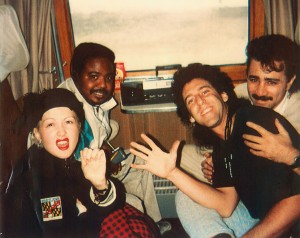
On the road in Russia with the Songwriters Summit
Cyndi Lauper––Jerry Knight––Paul Chiten––Franke Previte
MS:
In my early days, it was sheer enthusiasm for the music and the work to be done that kept me going. Now I’d like to know how other musicians stay on top of their craft.
PC:
You have to stay on top of your craft, or your craft might get on top of you.
I keep my ear tilted towards what’s happening now, and where that might be leading in the future. But that’s only part of it.
For many years I was signed as a songwriter. Publishers want their songwriters to compose hits, because that’s where the money is. They are, after all, in business to make money––or fetti, scrilla, gwop, cheddar, bank––whatever you want to call it. And we artists need to make a living, too.
There is always pressure to try to duplicate something that’s already successful. Songwriters call it “chasing the hit.” However, it’s not necessary to follow every popular movement just because it happens to be trending that week. I do stay open to what’s going on, and plugging in the elements that I find appealing into my own sound. But I’m not a slave to fashion for fashion’s sake.
There is actually more diversity in popular music now than in any previous era. Not only in the variety of sounds and styles that are out there, but the playing field has changed. A large record label is no longer necessary to launch an artist, band or song. Savvy Internet marketing can create a buzz that formerly took huge amounts of corporate promotion money and aggressive marketing to achieve.
Hey, there will always be somebody coming down the pike who can play faster licks, compose catchier hooks, jump further or fly higher. My goal has always been to cultivate something that is uniquely mine.
That way, nobody will be able to do me –– quite as well as me.

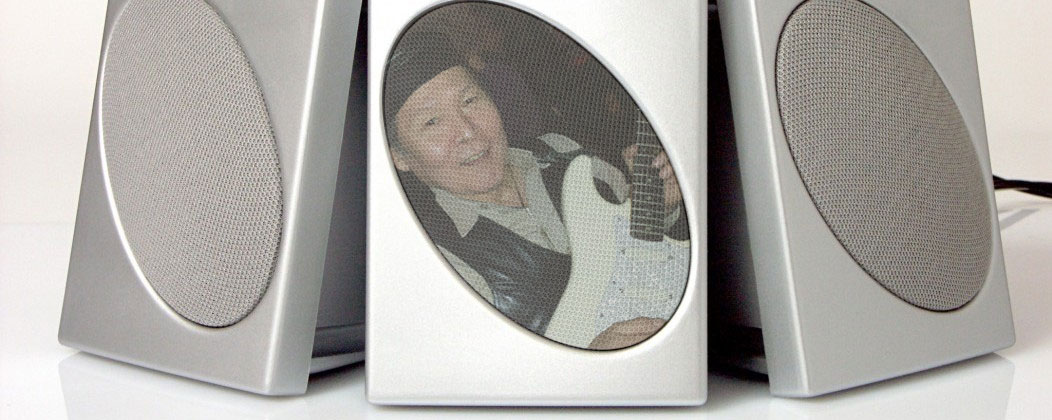
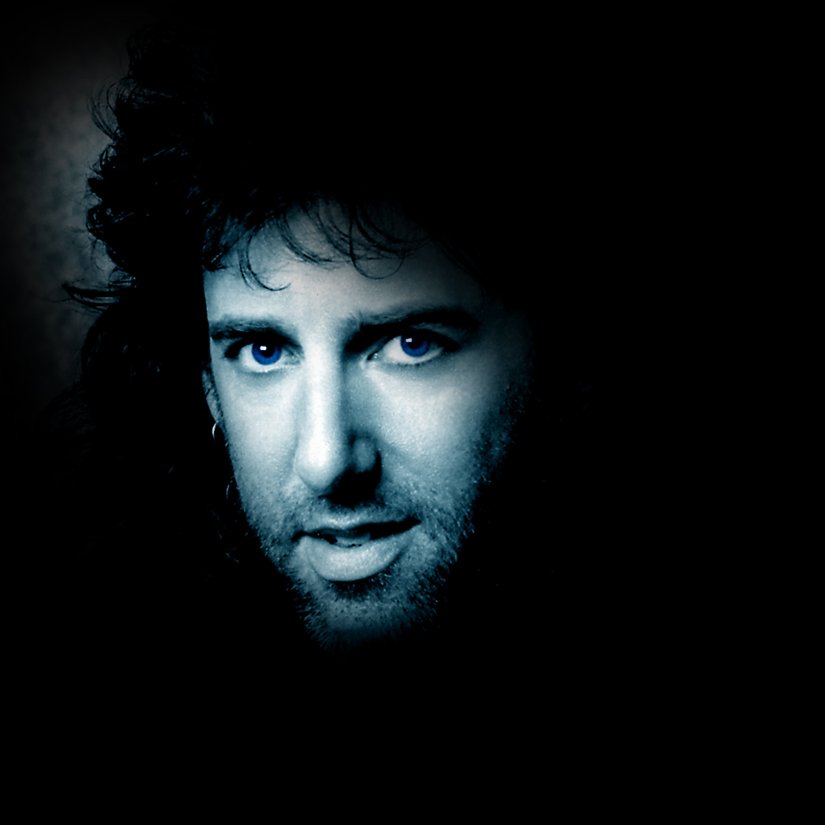
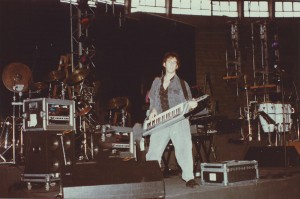
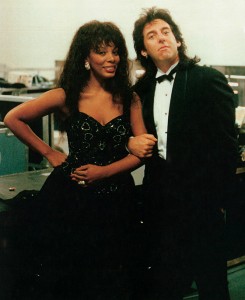
Paul speaks with much experience. Very informative about the life of a professional musician belonging to a musician’s union.
Did you write a song with Cyndi Lauper?
“Dancing With A Stranger”, (C) 1989. Cindi Lauper & Paul Chiten. I found IT !
It was very informative sitting in on the Paul Chiten interview.